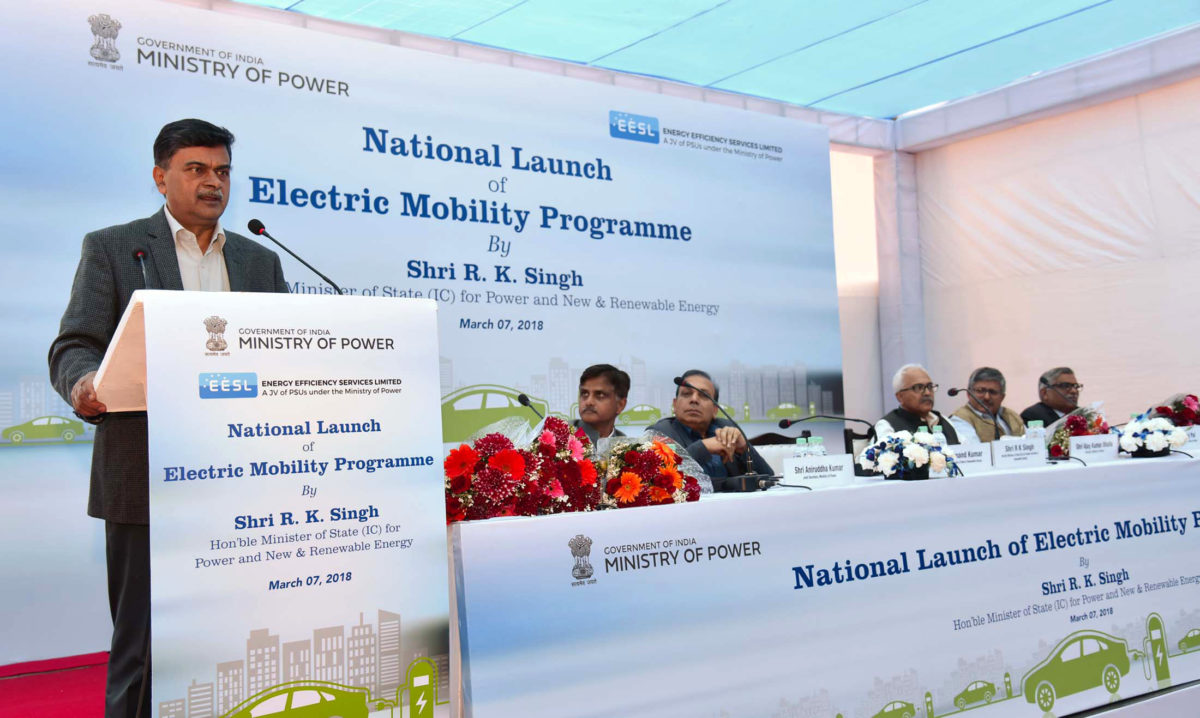Raj Kumar Singh, Minister of State for Power and New and Renewable Energy, today (March 7) launched a national electric mobility program organized by Energy Efficiency Services Ltd (EESL) India.
It is a significant step towards achieving a cleaner and greener mobility sector in India. Now that a program is in place, it will encourage people and private players to act more aggressively in this sector, who are planning to contribute in Indian e-mobility sector.
The program aims to provide impetus to the Indian e-mobility ecosystem, including electric vehicle (EV) manufacturers, charging infrastructure companies, fleet operators, and service providers.
Speaking on the occasion, Secretary, Ministry of Power, Ajay Kumar Bhalla said that the government is focusing on creating charging infrastructure and policy framework so that by 2030 more than 30% of vehicles on the road are EVs.
During the program launch, it was also highlighted that there would be no need for the license for establishing the charging infrastructure in the country and the tariff for this would be less than INR 6 ($0.092).
On the occasion, Singh talked about the critical need of energy efficiency in the present time and the nation’s role in contributing towards a sustainable future through energy efficient appliances and now, EVs.
The program will be implemented by EESL which will aggregate demand by procuring EVs in bulk to reach economies of scale.
Singh announced the second EV tender for delivering 10,000 EVs for state and central government builds. These EVs will replace the existing fleet of petrol and diesel vehicles. Aiming to increase the EV count to 20,000 across India, EESL mentioned that with this e-mobility can save the country over 50 million liters of fuel and 560,000 tons of CO2 emissions annually, Kumar said.
The per kilometer cost for an electric car is just INR 85 paisa ($0.013) against INR 6.5 ($0.1) for standard fossil fuel cars, and these would also help us achieve autonomy from expensive petroleum imports, Singh added.
Rajeev Sharma, Chairman, EESL, said, “We are committed to creating a robust market for e-mobility in India to enable more energy and fuel savings, in continuance with our mission to transform markets for advanced technologies with innovative business models.”
At the launch, Tata Motors and Mahindra & Mahindra has handed their EVs for the government use tendered by the EESL. Tata motors have revealed its TigorEV at the event and later tweeted it has committed to transforming mobility in India by fueling the electric aspirations of the nation.
Exicom power systems also installed AC, and DC EV charging station at Ministry of Power building in New Delhi unveiled during the launch of the program.
5 million LED streetlights installed
Calling the installation of five million LED street lights by EESL “a very impressive milestone for our country,” Singh reiterated the path of energy efficiency that the Prime Minister Narendra Modi chose for the country on the sidelines of Paris Summit in 2015. He said that India aims to develop as a responsible power, with the motto- “Healthier world, healthier country,” and the long-term goal is to leave behind a better world.
EESL mentioned the installation of 5,010,236 LED lightings, as of March 7, 2018, will save 1.35 billion kWh of energy, equivalents INR 7.42 billion ($114.34 million) in cost, and reduce approximately 1.1 million tons of CO2 emissions annually.
Saying, “The future is electric,” the Minister said that in most of the developed world cooking is electric, and many countries have announced dates to phase out their diesel vehicles. Even our IIT teams have developed the electric cooking system, and we are going to go electric and go green. He invited the industry to be part of India’s growth story, and said: “My message to industry is, come and invest in manufacturing of e-vehicles and batteries.”
This content is protected by copyright and may not be reused. If you want to cooperate with us and would like to reuse some of our content, please contact: editors@pv-magazine.com.








3 comments
By submitting this form you agree to pv magazine using your data for the purposes of publishing your comment.
Your personal data will only be disclosed or otherwise transmitted to third parties for the purposes of spam filtering or if this is necessary for technical maintenance of the website. Any other transfer to third parties will not take place unless this is justified on the basis of applicable data protection regulations or if pv magazine is legally obliged to do so.
You may revoke this consent at any time with effect for the future, in which case your personal data will be deleted immediately. Otherwise, your data will be deleted if pv magazine has processed your request or the purpose of data storage is fulfilled.
Further information on data privacy can be found in our Data Protection Policy.